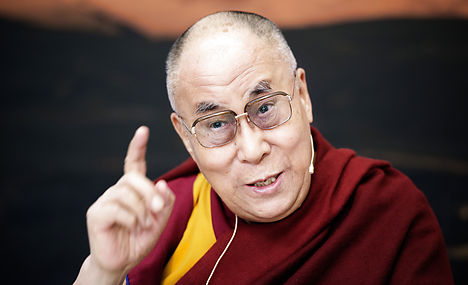CHINA
Dalai Lama has ‘nothing to ask’ Danish politicians
Prime Minister Helle Thorning-Schmidt's failure to follow through on a promise to meet with the Dalai Lama has caused her political headaches, but the Tibetan spiritual leader told the media he understood the decision.
Published: 11 February 2015 14:37 CET

The Dalai Lama is in Copenhagen for a two-day seminar. Photo: Claus Bech/Scanpix
The Dalai Lama said Wednesday that the Danish government's reluctance to meet him during a visit to Denmark was "logical" since his retirement meant he had "nothing to ask" politicians.
"I think it's quite logical. I have no political responsibility so even if I met some political leaders I have nothing to ask," the exiled spiritual leader — who retired from politics in 2011 — said at a press conference in Copenhagen.
See also: Dalai Lama stiffed by Danish leaders
Denmark's relationship with China was strained after former Prime Minister Lars Løkke Rasmussen held a meeting — described as private, not official — with the Dalai Lama in 2009.
Bilateral ministerial meetings were cancelled, and relations only warmed after Copenhagen sent a diplomatic note to Beijing saying Demark was "fully aware of the importance and sensitivity of Tibet-related issues and attaches great importance to the view of the Chinese government."
China considers Tibet an integral part of its territory, and regards the Dalai Lama as a separatist.
The Dalai Lama said the lack of a free media was a major obstacle to China becoming a democratic nation, and that censorship fomented Chinese people's "suspicion" of other countries.
"The free world has [a] responsibility to bring China into the mainstream of world democracy. Chinese people also want that," he said.
The Nobel Peace Prize laureate said that once the Chinese people "know the reality, they also have the ability to judge what is right or what is wrong."
"Whenever you have the opportunity, visit China and meet more people. And also if there is some kind of possibility, bring some Chinese media people, some Chinese intellectuals here," he said.
The Dalai Lama arrived in Copenhagen on Tuesday after being invited by a group of Tibetan-Buddhist organisations.
Observers say China's growing clout on the world stage has made international government leaders increasingly reluctant to meet with him.
A summit of Nobel peace laureates in Cape Town was cancelled in October after several pulled out in protest at the South African government's failure to give the Dalai Lama a visa.
In May, the Norwegian government came under fire for declining to meet with him in a controversial decision aimed at warming up icy relations with China, which froze high-level contacts with Oslo after Chinese dissident Liu Xiaobo was awarded the Nobel Peace Prize in 2010.
Last week China reiterated that is was opposed to foreign countries receiving the Dalai Lama, one day after US President Barack Obama held a symbolic first public encounter with him.
Url copied to clipboard!


 Please whitelist us to continue reading.
Please whitelist us to continue reading.
Member comments